Photo: Scott Dudelson/WireImage.com
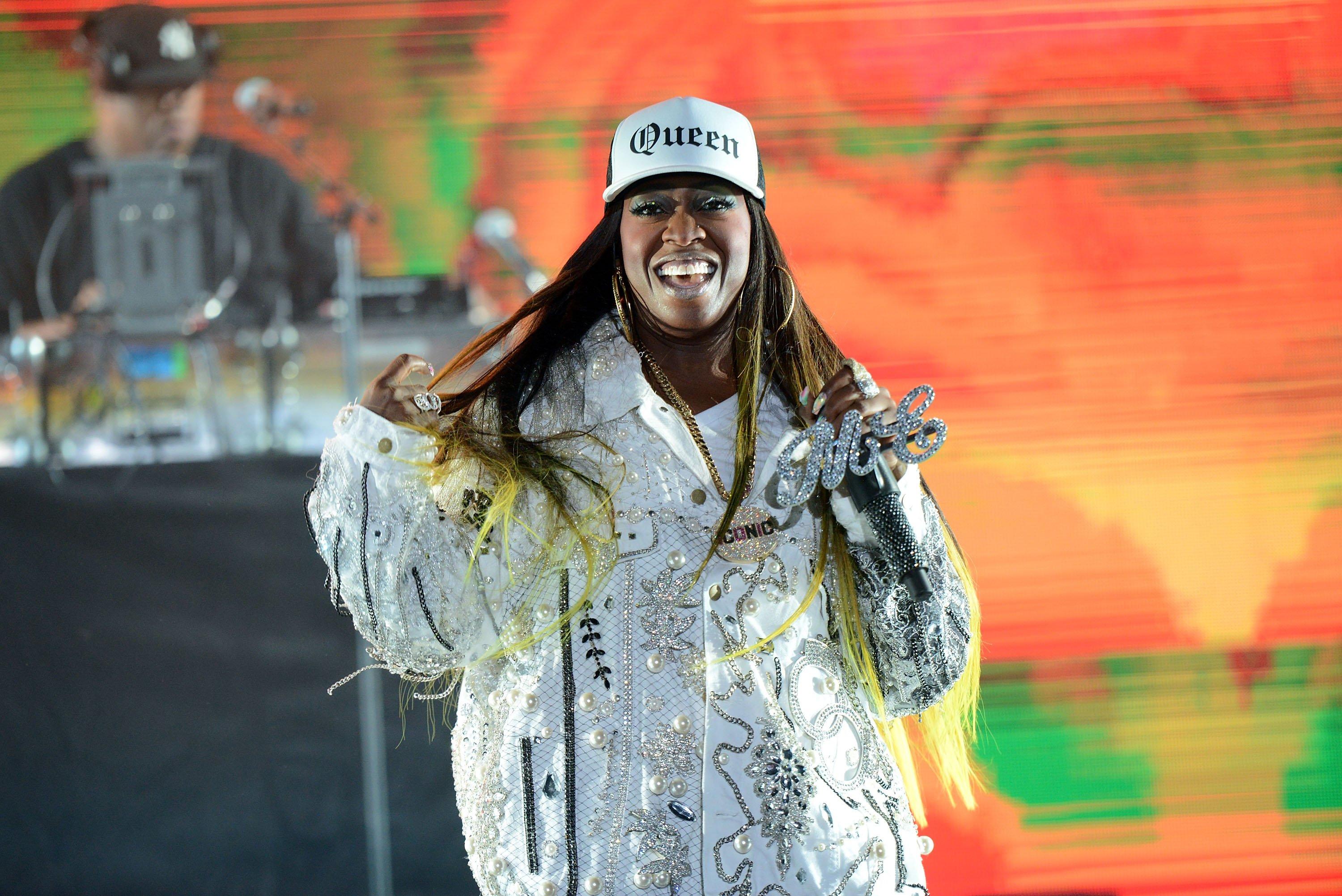
Missy Elliott
news
Missy Elliott To Receive Essence 2018 Black Women In Music Honor
The GRAMMY winner will be honored at Essence's 2018 Black Women In Music event in January
Four-time GRAMMY winner Missy Elliott has been selected as the honoree for Essence magazine's 2018 Black Women In Music event in New York on Jan. 25, 2018.
<iframe width="620" height="349" src="https://www.youtube.com/embed/cjIvu7e6Wq8" frameborder="0" gesture="media" allow="encrypted-media" allowfullscreen></iframe>
A trendsetting artist, Elliott's debut album, 1997's Supa Dupa Fly, combined elements of hip-hop, dance, R&B, electronic music, and soul with groundbreaking production courtesy of Timbaland.
Elliott earned her first career nominations at the 40th GRAMMY Awards, including Best Rap Album for Supa Dupa Fly and Best Rap Solo Performance for "The Rain (Supa Dupa Fly)."
She earned her first career GRAMMY for Best Rap Solo Performance for "Get Ur Freak On" for 2001, which was followed by GRAMMYs in consecutive years for "Scream aka Itchin'" and "Work It." Her most recent GRAMMY win came for 2005 for Best Short Form Music Video for "Lose Control."
<blockquote class="twitter-tweet" data-lang="en"><p lang="en" dir="ltr">ANNOUNCEMENT: We’re so excited to announce that we will be honoring our supa dupa fly iconic sister <a href="https://twitter.com/MissyElliott?ref_src=twsrc%5Etfw">@MissyElliott</a> at the 2018 <a href="https://twitter.com/hashtag/BlackWomenInMusic?src=hash&ref_src=twsrc%5Etfw">#BlackWomenInMusic</a> celebration. <a href="https://t.co/5qj3B6avWA">https://t.co/5qj3B6avWA</a> <a href="https://t.co/25dCAS00EF">pic.twitter.com/25dCAS00EF</a></p>— ESSENCE (@Essence) <a href="https://twitter.com/Essence/status/941308421042855936?ref_src=twsrc%5Etfw">December 14, 2017</a></blockquote>
<script async src="https://platform.twitter.com/widgets.js" charset="utf-8"></script>
Elliott's last studio album, 2005's The Cookbook, spawned the hits "Lose Control" and "We Run This."
In addition to her success as a solo artist, songwriter and producer, Elliott has collaborated on hits for artists such as Whitney Houston, Beyoncé, Mariah Carey, Mary J. Blige, and Fantasia, among others.
In January 2017 she dropped a new single, "I'm Better" featuring Lamb.
Essence established Black Women In Music in 2010 to highlight the accomplishments of "both emerging and established artists and influencers." Previous honorees include GRAMMY winners Blige, Erykah Badu, Jill Scott, and Kelly Rowland.
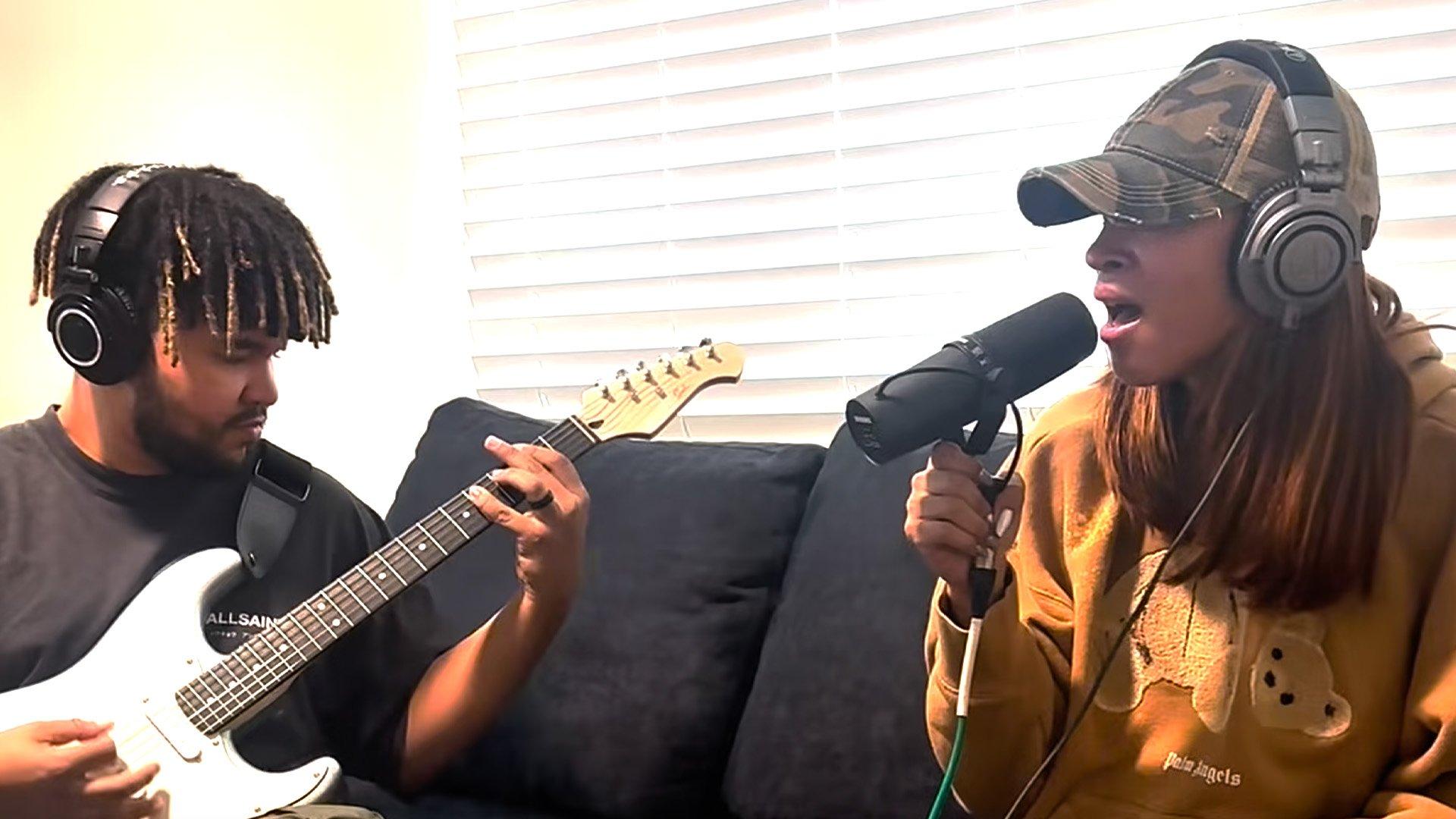
Photo: Courtesy of Genia
video
Press Play: Watch Genia Narrate The Pain Of Heartbreak In This Raw Performance Of "Dear Life"
R&B singer Genia offers an acoustic rendition of "Dear Life," one of the singles from her forthcoming mixtape, '4 AM In The Ville,' out April 19 via Def Jam.
On "Dear Life," R&B singer Genia pens a farewell letter to her lover — while simultaneously reflecting on how the intense saga crumbled her.
"I can't take anymore/ Put my pride aside, thought you could save me," she cries in the first verse. "These days, I don't know what I need/ You destroy me from the inside out/ If I go off the deep end/ You'll be sure not to bring me back."
In this episode of Press Play, watch Genia deliver a stripped-down performance of the vulnerable track alongside her guitarist.
The California native released "Dear Life" on Nov. 10, via Def Jam Recordings. She has also dropped three more singles — "Like That," "Know!," and "Let Me Wander" — leading up to her sophomore mixtape, 4 AM In The Ville, on April 19. 4 AM is a sequel to her debut, 4 PM In The Ville; both projects are inspired by Genia's experience of growing up in Victorville, California.
""[The songs] explore the different stages of grief in a relationship," she revealed in an interview with Urban Magazine. "The second tape is really me touching on falling in love, betrayal, anger, and rape."
Watch the video above to hear Genia's acoustic performance of "Dear Life," and check back to GRAMMY.com for more new episodes of Press Play.
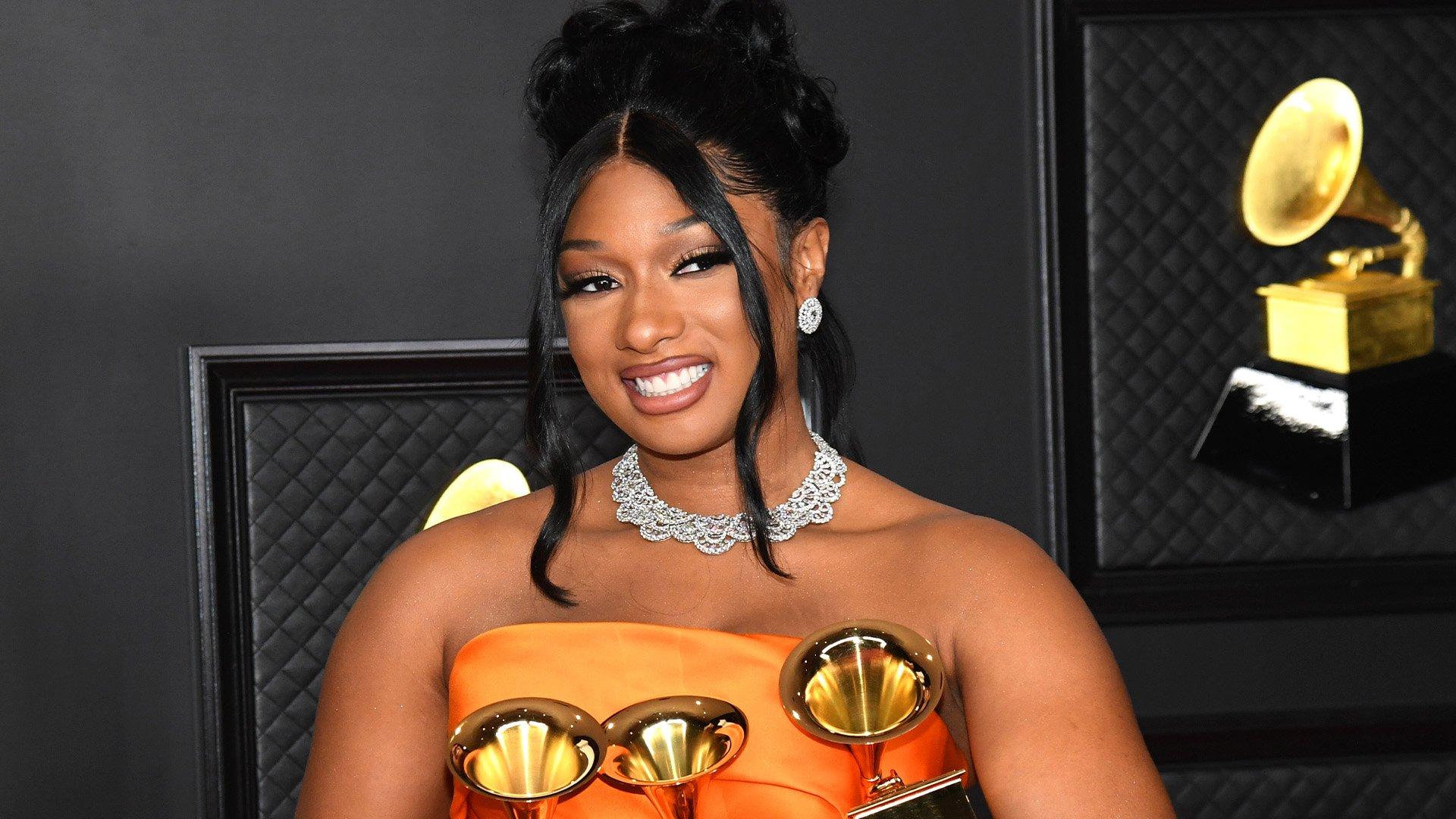
Photo: Kevin Mazur/Getty Images for The Recording Academy
video
GRAMMY Rewind: Megan Thee Stallion Went From "Savage" To Speechless After Winning Best New Artist In 2021
Relive the moment Megan Thee Stallion won the coveted Best New Artist honor at the 2021 GRAMMYs, where she took home three golden gramophones thanks in part to her chart-topping smash "Savage."
In 2020, Megan Thee Stallion solidified herself as one of rap's most promising new stars, thanks to her hit single "Savage." Not only was it her first No. 1 song on the Billboard Hot 100, but the "sassy, moody, nasty" single also helped Megan win three GRAMMYs in 2021.
In this episode of GRAMMY Rewind, revisit the sentimental moment the Houston "Hottie" accepted one of those golden gramophones, for Best New Artist.
"I don't want to cry," Megan Thee Stallion said after a speechless moment at the microphone. Before starting her praises, she gave a round of applause to her fellow nominees in the category, who she called "amazing."
Along with thanking God, she also acknowledged her manager, T. Farris, for "always being with me, being by my side"; her record label, 300 Entertainment, for "always believing in me, sticking by through my craziness"; and her mother, who "always believed I could do it."
Megan Thee Stallion's "Savage" remix with Beyoncé also helped her win Best Rap Song and Best Rap Performance that night — marking the first wins in the category by a female lead rapper.
Press play on the video above to watch Megan Thee Stallion's complete acceptance speech for Best New Artist at the 2021 GRAMMY Awards, and remember to check back to GRAMMY.com for more new episodes of GRAMMY Rewind.
Black Sounds Beautiful: How Megan Thee Stallion Turned Viral Fame Into A GRAMMY-Winning Rap Career
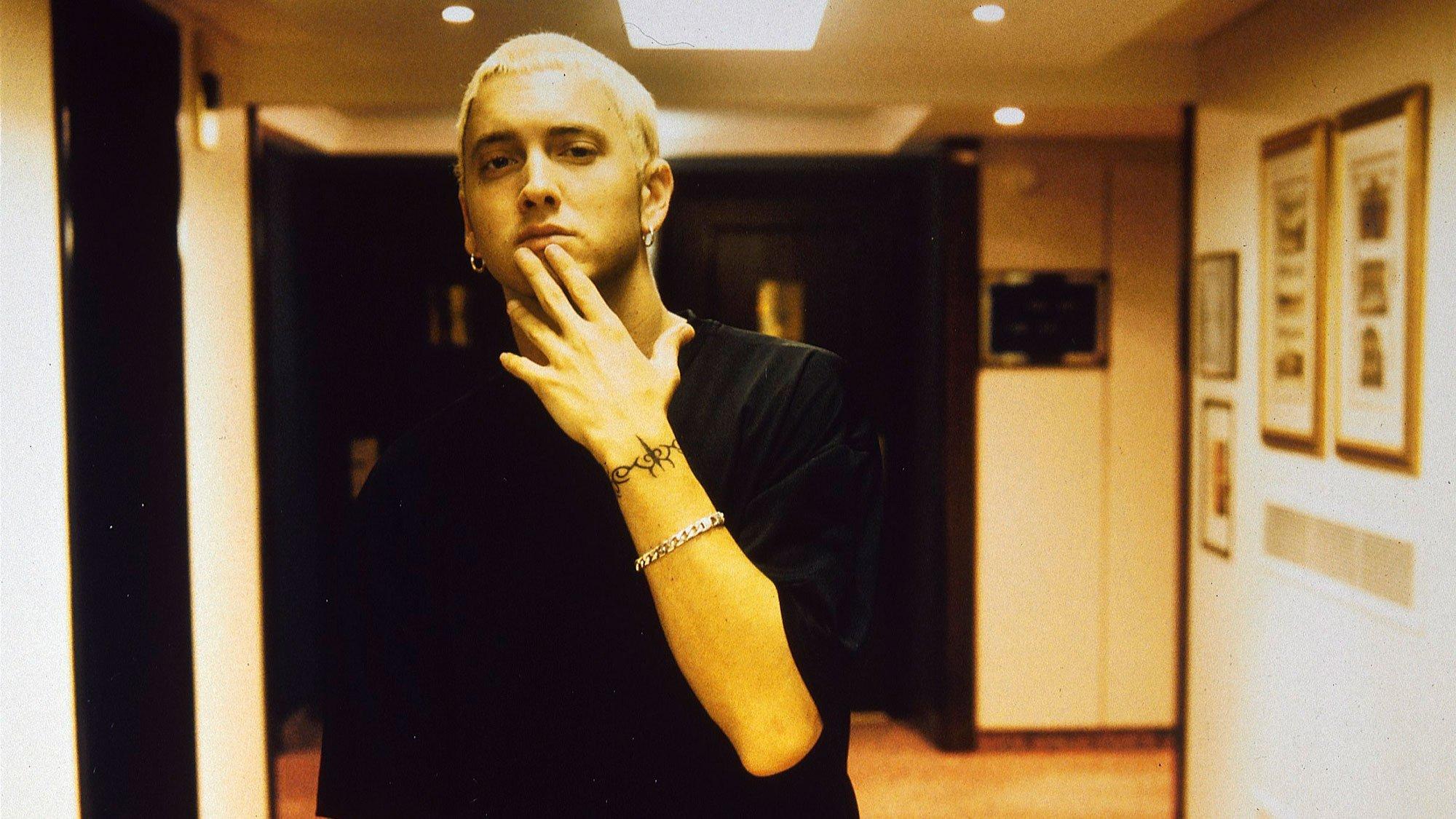
Photo: Sal Idriss/Redferns/GettyImages
list
4 Reasons Why Eminem's 'The Slim Shady LP' Is One Of The Most Influential Rap Records
Eminem’s major label debut, 'The Slim Shady LP,' turns 25 on Feb. 23. The album left an indelible imprint on hip-hop, and introduced the man who would go on to be the biggest-selling artist of any genre in the ensuing decade.
A quarter century has passed since the mainstream music world was first introduced to a bottle-blonde enfant terrible virtuoso who grabbed everyone’s attention and wouldn’t let go
But enough about Christina Aguilera.
Just kidding. Another artist also exploded into stardom in 1999 — one who would become a big enough pop star, despite not singing a note, that he would soon be feuding with Xtina. Eminem’s biting major label debut The Slim Shady LP turns 25 on Feb. 23. While it was Eminem's second release, the album was the first taste most rap fans got of the man who would go on to be the biggest-selling artist in any genre during the ensuing decade. It also left an indelible imprint on hip-hop.
The Slim Shady LP is a record of a rapper who was white (still a comparative novelty back in 1999), working class and thus seemingly from a different universe than many mainstream rappers in the "shiny suit era." And where many of those contemporaries were braggadocious, Eminem was the loser in his rhymes more often than he was the winner. In fact, he talked so much about his real-life childhood bully on the album that the bully ended up suing him.
It was also a record that played with truth and identity in ways that would become much more difficult once Em became world famous. Did he mean the outrageous things he was saying? Where were the knowing winks, and where were they absent? The guessing games that the album forced listeners to play were thrilling — and made all the more intense by his use of three personas (Marshall Mathers the person; Eminem the battle rapper; and Slim Shady the unhinged alter ego) that bled into each other.
And, of course, there was the rhyming. Eminem created a dizzying array of complicated compound rhymes and assonances, even finding time to rhyme "orange" — twice. (If you’re playing at home, he paired "foreign tools" with "orange juice" and "ignoring skill" with "orange bill.")
While the above are reason enough to revisit this classic album, pinpointing The Slim Shady LP's influence is a more complicated task. Other records from that year — releases from Jay-Z, Nas, Lil Wayne, Ludacris, and even the Ruff Ryders compilation Ryde or Die Vol. 1 — have a more direct throughline to the state of mainstream rap music today. So much of SSLP, on the other hand, is tied into Eminem’s particular personality and position. This makes Slim Shady inimitable; there aren’t many mainstream rappers complaining about their precarious minimum wage job, as Em does on "If I Had." (By the time of his next LP, Em had gone triple-platinum and couldn’t complain about that again himself.)
But there are aspects of SSLP that went on to have a major impact. Here are a few of the most important ones.
It Made Space For Different Narratives In Hip-Hop
Before Kanye rapped about working at The Gap, Eminem rapped about working at a burger joint. The Slim Shady LP opened up space for different narratives in mainstream rap music.
The Slim Shady LP didn't feature typical rags-to-riches stories, tales of living the high life or stories from the street. Instead, there were bizarre trailer-park narratives (in fact, Eminem was living in a trailer months after the record was released), admissions of suicidal ideation ("That’s why I write songs where I die at the end," he explained on "Cum on Everybody"), memories of a neglectful mother, and even a disturbing story-song about dumping the corpse of his baby’s mother, rapped to his actual child (who cameos on the song).
Marshall Mathers’ life experience was specific, of course, but every rapper has a story of their own. The fact that this one found such a wide audience demonstrated that audiences would accept tales with unique perspectives. Soon enough, popular rappers would be everything from middle-class college dropouts to theater kids and teen drama TV stars.
The Album Explored The Double-Edged Sword Of The White Rapper
Even as late in the game as 1999, being a white rapper was still a comparative novelty. There’s a reason that Em felt compelled to diss pretty much every white rapper he could think of on "Just Don’t Give a F—," and threatened to rip out Vanilla Ice’s dreadlocks on "Role Model": he didn’t want to be thought of like those guys.
"People don't have a problem with white rappers now because Eminem ended up being the greatest artist," Kanye West said in 2015. You can take the "greatest artist" designation however you like, but it’s very true that Eminem’s success meant a categorical change in the status of white rappers in the mainstream.
This turned out to be a mixed blessing. While the genre has not, as some feared, turned into a mostly-white phenomenon, America’s racial disparities are often played out in the way white rappers are treated. Sales aside, they have more room to maneuver artistically — playing with different genres while insulting rap a la Post Malone, or even changing styles completely like Machine Gun Kelly — to commercial approbation. Black artists who attempt similar moves are frequently met with skepticism or disinterest (see André 3000’s New Blue Sun rollout, which was largely spent explaining why the album features no rapping).
Sales are worth speaking about, too. As Eminem has repeatedly said in song, no small amount of his popularity comes from his race — from the fact that white audiences could finally buy music from a rapper who looked like them. This was, as he has also bemusedly noted, the exact opposite of how his whiteness worked for him before his fame, when it was a barrier to being taken seriously as a rapper.
For better, worse, or somewhere in between, the sheer volume of white rappers who are currently in the mainstream is largely traceable to the world-beating success of The Slim Shady LP.
It Was Headed Towards An Odd Future
SSLP laid groundwork for the next generation of unconventional rappers, including Tyler, the Creator.
Tyler is a huge Eminem fan. He’s said that listening to Em’s SSLP follow-up The Marshall Mathers LP was "how I learned to rap." And he’s noted that Em’s Relapse was "one of the greatest albums to me."
"I just wanted to rap like Eminem on my first two albums," he once told GQ. More than flow, the idea of shocking people, being alternately angry and vulnerable, and playing with audience reaction is reflected heavily on Tyler’s first two albums, Goblin and Wolf. That is the template The Slim Shady LP set up. While Tyler may have graduated out of that world and moved on to more mature things, it was following Em’s template that first gained him wide notice.
Eminem Brought Heat To Cold Detroit
The only guest artist to spit a verse on The Slim Shady LP is Royce da 5’9". This set the template for the next few years of Eminem’s career: Detroit, and especially his pre-fame crew from that city, would be his focus. There was his duo with Royce, Bad Meets Evil, whose pre-SSLP single of "Nuttin’ to Do"/"Scary Movies" would get renewed attention once those same two rappers had a duet, smartly titled "Bad Meets Evil," appear on a triple-platinum album. And of course there was the group D12, five Detroit rappers including his best friend Proof, with whom Eminem would release a whole album at the height of his fame.
This was not the only mainstream rap attention Detroit received in the late 1990s. For one thing, legendary producer James "J Dilla" Yancey, was a native of the city. But Eminem’s explosion helped make way for rappers in the city, even ones he didn’t know personally, to get attention.
The after-effects of the Eminem tsunami can still be seen. Just look at the rise of so-called "scam rap" over the past few years. Or the success of artists like Babyface Ray, Kash Doll, 42 Dugg, and Veeze. They may owe little to Em artistically, but they admit that he’s done great things for the city — even if they may wish he was a little less reclusive these days.
Is Eminem's "Stan" Based On A True Story? 10 Facts You Didn't Know About The GRAMMY-Winning Rapper
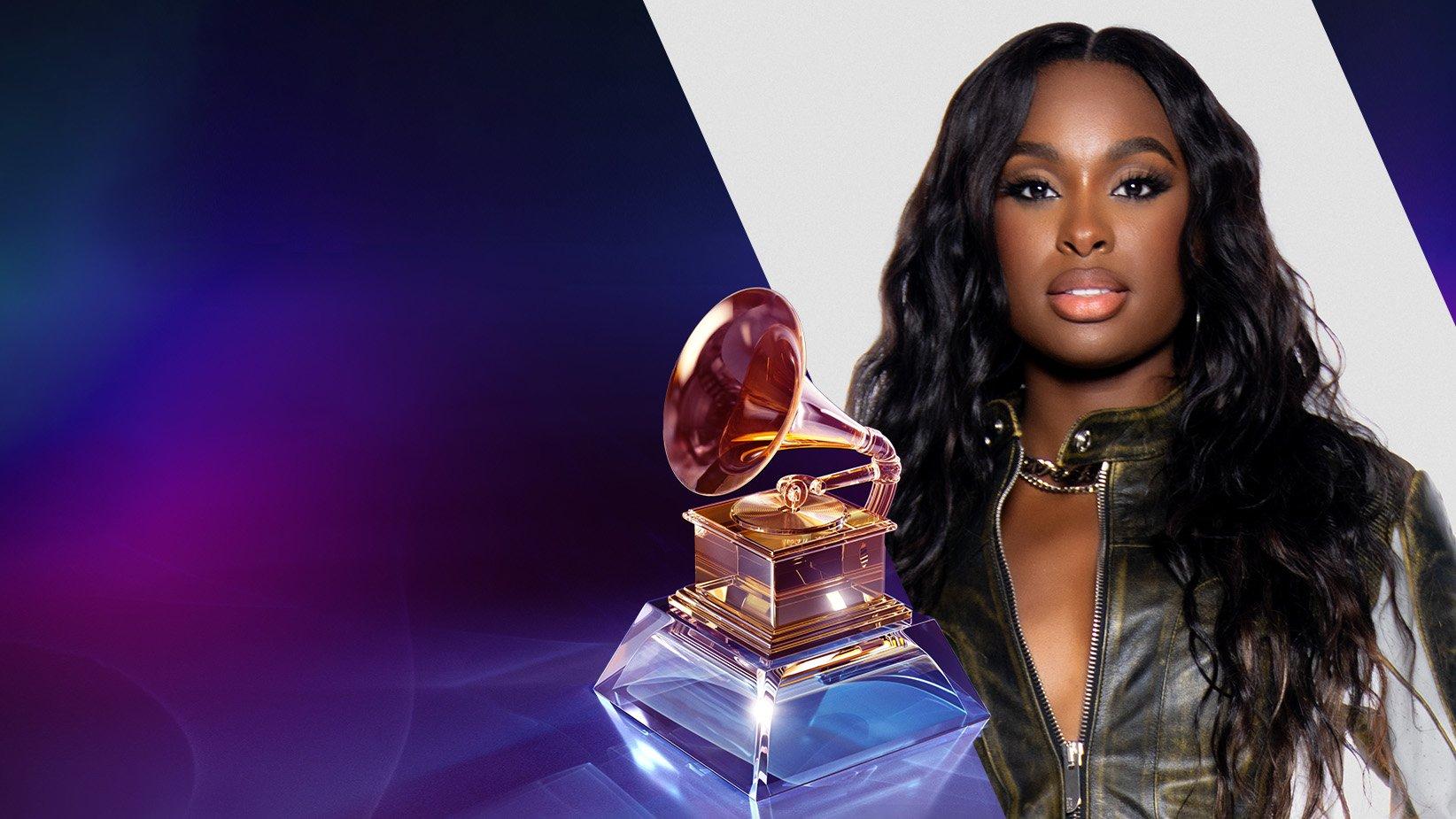
Photo: Courtesy Coco Jones
interview
Meet The First-Time GRAMMY Nominee: Coco Jones On Her Breakthrough Year, Turning Rejection Into Purpose & Learning From Babyface
Coco Jones is nominated across five categories at the 2024 GRAMMYs, including Best New Artist and Best R&B Album for her EP, 'What I Didn't Tell You.' The first-time nominee discussed her hit, "ICU," working with legends and the power of representation.
Coco Jones is feeling more inspired than ever following a year of exciting surprises and breakthroughs. In 2023, the 25-year-old budding star celebrated her first Billboard Hot 100 entry thanks to her platinum-selling "ICU" single, embarked on her first headlining tour, and earned her first GRAMMY nominations.
"Being a GRAMMY-nominated artist changes everything. It's such a different creative mindset when the world says, 'You're good, we like what you do,'" Jones tells GRAMMY.com. "It's like a gold star. It makes you want to work harder, it makes you wanna continue to impress, and it makes you impressed with yourself, too."
Jones is nominated across five categories at the 2024 GRAMMYs: Her 2022 EP What I Didn't Tell You is up for Best R&B Album and its "ICU" will compete for Best R&B Performance and Best R&B Song. Her feature on Babyface's "Simple" has received a nod for Best Traditional R&B Performance. Jones is also up for the coveted golden gramophone for Best New Artist.
In recent years, her vocal prowess has received praise from SZA, Janet Jackson, and Beyoncé, but anyone who's even remotely familiar with Jones' story knows that her newfound success is anything but overnight. Jones first found success at age 14, when she starred in the 2012 Disney movie musical Let It Shine. The Tennessee native faced colorism early on, which she addressed in a 2020 YouTube video that went viral.
"I always wanted that representation that my dreams were possible growing up," she shares. "I definitely was not based in reality of what the entertainment industry is. It's tough and it's challenging and sometimes it isn't fair and that is not what I was prepared for as a kid."
During the pandemic, Jones secured a spot in "Bel-Air" (Peacock's reimagining of "The Fresh Prince of Bel-Air") as the spoiled yet beloved Hilary Banks, but she never let go of her love of music. Following her 2014 departure from Hollywood Records, Jones released music independently, including the ominous "Hollyweird" and "Depressed"; when Def Jam approached her in the summer of 2021, she was ready for her close-up.
Fast forward to present, and Jones is gearing up for one of the most pivotal nights of her blossoming career. But perhaps the most precious thing she's collected along the way is self-assurance. "I'm learning that I have to believe in my creative choices and that I shouldn't second guess what I feel because it does well," she says with a laugh.
Of her recent success, Jones says the back-to-back accolades shocked her, but like a true artist, she's already thinking ahead and manifesting an exciting first for 2024: "I want my debut album to hit No. 1 on the Billboard 200 chart."
Ahead of the 2024 GRAMMYs, Jones discusses the power of representation for dark-skinned Black women, why her mother is her biggest inspiration, and how joining forces with Babyface created momentum in her career.
This interview has been condensed and edited for clarity.
After finding out that you received five GRAMMY nominations, you posted an Instagram video showing you and your mother reveling in the excitement of it all. Tell me more about that moment and your mother's role in this journey.
I'm one of four children and my mom owned multiple businesses, but she made us all feel loved and supported while also being a boss. Watching her navigate the entertainment industry — which she had no prior experience with — was very inspiring. She took every challenge head-on and still managed to make time with all of her kids.
She's always been a visionary, so I think for her, it's like, This is exactly what we worked for. The end goal is to be award-winning, to be show-stopping, to be classic, to be timeless. That's what she saw for me even when I was a little girl on stage singing Aretha Franklin.
There were times when it was hard for me to see what she saw in me, especially when you're dealing with the rejection that is the music industry. But she always knows the right thing to say to keep me going and to keep my faith. So, when it wasn't like how it is now, she was the entire team. She did anything she could to help me progress.
You retweeted a meet-and-greet with a fan, who donned your merch from 2018, which seemed to take you by surprise. It seems like your 2023 breakthrough was a win for not just yourself, but for those early supporters as well.
I would definitely say it's a win for my fans and my supporters, but also for young Black women who look like me and have big dreams and just want to see what they are dreaming about is possible. I know that I inspire so many young Black women — they tell me almost every day that seeing me win helps them believe in themselves winning.
My goal is to continue to break those barriers down for young Black women so that it's not such a surprise when we succeed.
In a 2022 interview, you said you wanted to experience the highs of being an entertainer and being on stage "even if it meant a lot of lows." Many creatives feel that way. Do you have any advice for struggling artists who feel like no one's paying attention?
You can make it this thing where you feel like you're running out of time, or you can make it feel like you're adjusting to time. Time is whatever you decide it is.
There were so many obstacles I didn't understand, but hindsight is 20/20. I needed the lessons that I learned, I needed the self-reliance, I needed the optimism and the faith. So, I think it was all very growing but still tough not knowing what was going to happen, not knowing if I was going to have that life-changing job, that life-changing song.
I'm just grateful to God for protecting me through all the confusion and for not giving up. I had enough support around me and enough doors to open even though they felt far and few between to keep me sustained and pursuing this dream, even though I was pursuing it without any guarantees.
What I Didn't Tell You isn't the first EP you released, but it's the one that made you a first-time GRAMMY nominee. What was different this time around?
I was very supported; when Def Jam approached me, they seemed so understanding of my vision that I couldn't help but feel like we were already a team. They helped me put the pieces together. Before this, I was just on my own or it was me and my mom, so I felt more supported with this EP release. My label understands me and what I want to be, and there's no pushback against who I am and what I can naturally do. It's all about enhancing.
As part of R&B's new class, what do you want to bring to the genre?
More uptempo! I want to be able to sing my heart out but make a bop that you wanna dance to. I love how Whitney Houston would do that with some of her songs like "I'm Your Baby Tonight" and "How Will I Know."
Your breakthrough single, "ICU," is up for Best R&B Song, but what lesser-known song off What I Didn't Tell You (Deluxe) would you nominate in the same category if you could?
"Fallin'" because it's a sensual song, and I feel like it sits in a really cool, pretty place in my voice. It also tells a good story of the chaos that my life is while also starting to fall for somebody.
In 2022, you joined forces with R&B legend Babyface for his collaborative Girls Night Out project. Your "Simple" duet with him is nominated for Best Traditional R&B Performance. Do you think collaborating with Babyface acted as a precursor for the incredible year you had?
When I learned Babyface wanted me on his album, I was beside myself. He was really one of the first legends to give me that stamp of approval. I definitely think the recognition I got from him was like a turning point in what was next for my life. The world started to notice around that time.
When I interviewed Babyface soon after the release of Girls Night Out, he talked about doing his homework to better understand the differences in today's R&B. That was surprising to hear, because he's clearly an expert at writing hit songs but not above learning from others. What did you learn from his mentorship?
I just learned that you can be a legend and you can still be open to ideas, open to new talents, and open to suggestions. Just stay open to what’s new, who's new, and why they're doing well, and that's what will keep you legendary.
I'm a big fan of studying music, so I will continue to be a student. Creating music and studying music are two different things to me. I study it and then I feel creative, so I think it's about separating them because sometimes if you're creating while studying, you just end up repeating exactly what somebody's doing and that doesn't feel authentic. It's more about getting inspired and then creating.
My love for music and being a creative is what keeps me going because it's not always fun, it's not always easy. Sometimes it's about business, sometimes it's about pushing past your exhaustion. I don't think I would do that, not for this long, if I didn't love the payoff of being a creative.
How will you celebrate if you win a GRAMMY?
I haven't thought about how I'm gonna celebrate. I think my favorite type of celebrations are intimate. They're with people who are in the mud with me — my family, my team. I would probably just want to have a great dinner and think about how far we've come and what's next.
